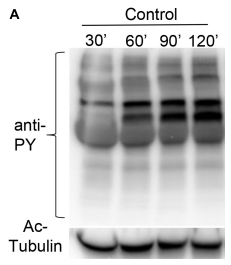Capacitation is the final maturation process that a spermatozoon must undergo in order to become competent to fertilize an egg. This ordinarily occurs within the female reproductive tract.
Capacitation involves changes to the sperm plasma membrane, such as cholesterol depletion. In addition, intracellular calcium levels rise and tyrosine phosphorylation occurs.
Reactive Oxygen Species (ROS) are known to play a role in capacitation. In Gabelev Khasin et al., 2020, our lab showed that capacitation in the presence of DEHP can lead to an abnormal capacitation profile. DEHP is known to chelate Zinc; DEHP may consequently destabilize Superoxide Dismutase (SOD), an enzyme that contains Copper and Zinc. SOD’s role in the cell is to turn the reactive Superoxide radical anion into O2 and Hydrogen Peroxide. This would then lead to heightened ROS levels, leading to the observed hyper-phosphorylation.

Figure from Gabelev Khasin et al, 2020

